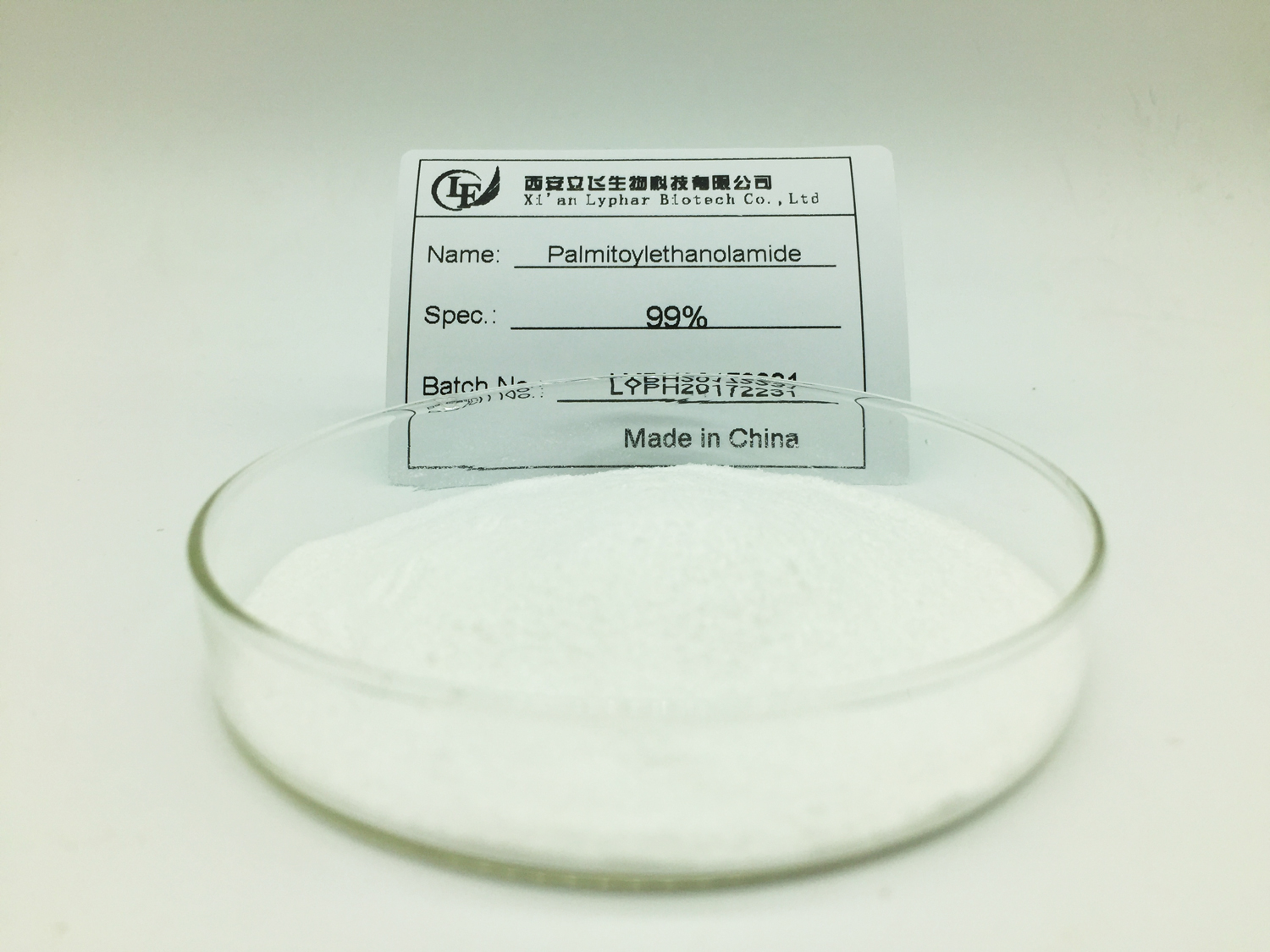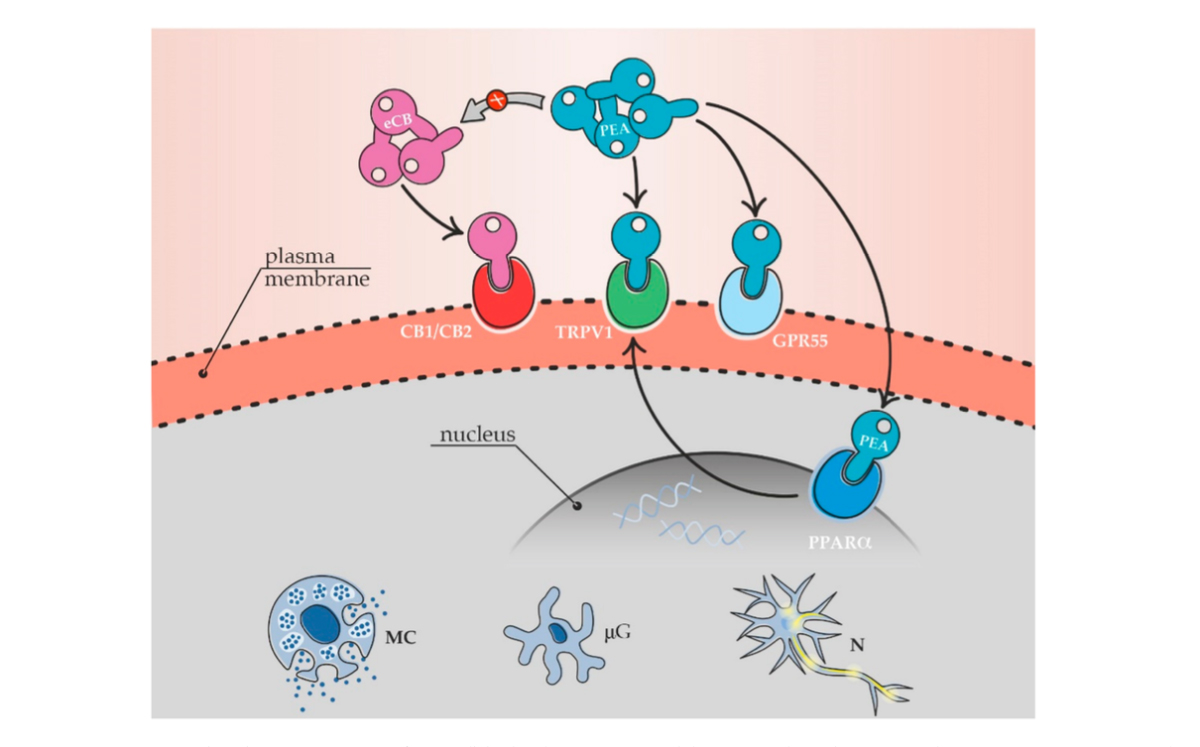Palmitoylethanolamide (PEA) is a naturally occurring fatty acid amide that has been investigated for its pharmacological properties. It is a lipid mediator that plays a significant role in modulating various physiological processes. Here are its primary pharmacological actions:
Anti-inflammatory:
- Palmitoylethanolamide has been shown to have anti-inflammatory properties. It works by modulating the activation of mast cells and inhibiting the release of pro-inflammatory mediators. It can also reduce the activation of certain receptors involved in inflammation, such as the transient receptor potential vanilloid 1 (TRPV1) receptor.
Analgesic:
- Palmitoylethanolamide has pain-relieving effects. It is thought to exert analgesia by interacting with the endocannabinoid system, although it does not directly bind to cannabinoid receptors. Instead, it may enhance the levels of endogenous cannabinoids (like anandamide), which can have pain-relieving effects. Additionally, Palmitoylethanolamide modulates TRPV1, a receptor involved in pain sensation.
Neuroprotective:
- Palmitoylethanolamide has neuroprotective effects, particularly in conditions of neuroinflammation. It can protect neurons from damage and support the maintenance of neuronal integrity. This action may be beneficial in conditions such as neurodegenerative diseases and traumatic brain injuries.

Antioxidant:
- Palmitoylethanolamide has antioxidant properties that help protect cells from oxidative stress, which is involved in various chronic diseases and aging processes.
Modulation of the Endocannabinoid System:
- While not directly acting on CB1 or CB2 receptors, PEA has an indirect influence on the endocannabinoid system. It can enhance the action of anandamide, an endogenous cannabinoid, by inhibiting its breakdown via the fatty acid amide hydrolase (FAAH) enzyme.
Immune System Modulation:
- Palmitoylethanolamide can modulate the immune system, influencing the activity of immune cells like microglia, which play a role in neuroinflammation, and mast cells, which are involved in allergic and inflammatory responses.
Antiallodynic:
- Palmitoylethanolamide has been shown to reduce allodynia, a condition where non-painful stimuli are perceived as painful, which is commonly seen in neuropathic pain.
Mood-enhancing and Anxiolytic Effects:
- Some studies suggest that Palmitoylethanolamide may have mood-enhancing effects, likely related to its modulation of the endocannabinoid system and its influence on the TRPV1 receptor. It may also have anxiolytic (anxiety-reducing) properties.

Clinical Applications:
- Neuropathic pain: Palmitoylethanolamide is used as a treatment for chronic pain, particularly neuropathic pain, where its anti-inflammatory and analgesic effects are beneficial.
- Inflammatory conditions: It may be useful in managing inflammatory disorders, including conditions like arthritis and colitis.
- Neurodegenerative diseases: There is some evidence to suggest that Palmitoylethanolamide may have a role in treating diseases like Alzheimer’s and Parkinson’s due to its neuroprotective effects.
- Fibromyalgia: Palmitoylethanolamide has been studied for its potential benefits in fibromyalgia, a condition characterized by widespread musculoskeletal pain and fatigue.
Mechanism of Action:
Palmitoylethanolamide exerts its effects through several mechanisms:
- Activation of peroxisome proliferator-activated receptor alpha (PPAR-α), which is involved in reducing inflammation and regulating lipid metabolism.
- Modulation of the TRPV1 receptor, which is involved in pain sensation.
- Inhibition of fatty acid amide hydrolase (FAAH), which increases levels of anandamide, a cannabinoid-like compound that can reduce pain and inflammation.

In summary, Palmitoylethanolamide is a multifunctional compound with a variety of pharmacological actions, primarily anti-inflammatory, analgesic, and neuroprotective, making it a potential therapeutic agent for several medical conditions, particularly those involving chronic pain and inflammation.
